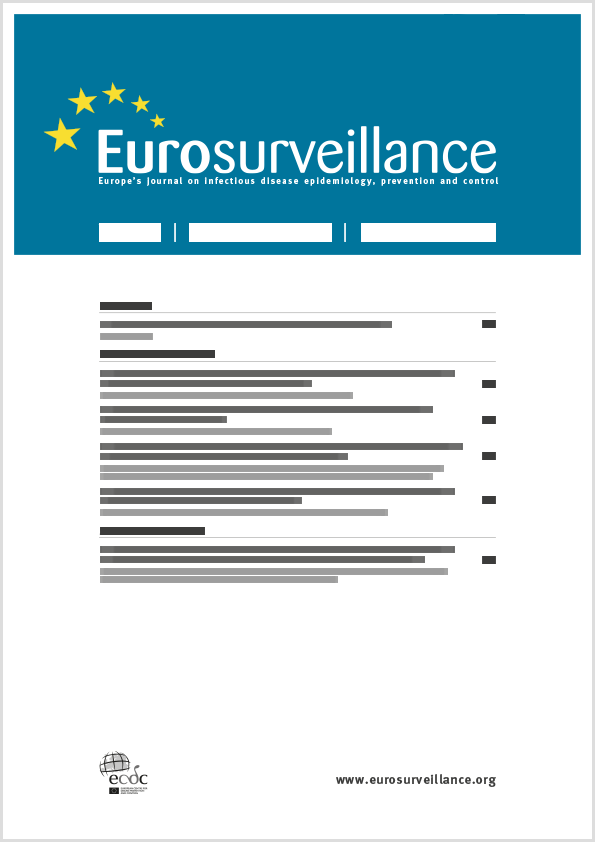- Home
- Eurosurveillance
- Previous Issues
- Volume 26, Issue 7, 18/Feb/2021
Eurosurveillance - Volume 26, Issue 7, 18 February 2021
Volume 26, Issue 7, 2021
- Rapid communication
-
-
-
Reducing contacts to stop SARS-CoV-2 transmission during the second pandemic wave in Brussels, Belgium, August to November 2020
More LessTo evaluate the effect of physical distancing and school reopening in Brussels between August and November 2020, we monitored changes in the number of reported contacts per SARS-CoV-2 case and associated SARS-CoV-2 transmission. The second COVID-19 pandemic wave in Brussels was the result of increased social contact across all ages following school reopening. Physical distancing measures including closure of bars and restaurants, and limiting close contacts, while primary and secondary schools remained open, reduced social mixing and controlled SARS-CoV-2 transmission.
-
- Top
-
- Outbreaks
-
-
-
An outbreak investigation of Legionella non-pneumophila Legionnaires’ disease in Sweden, April to August 2018: Gardening and use of commercial bagged soil associated with infections
More LessIn early June 2018, an increase in non-travel-related cases of Legionella non-pneumophila Legionnaires’ disease (LD) was observed in Sweden and a national outbreak investigation was started. Outbreak cases were defined as notified confirmed or probable cases of L. non-pneumophila LD, with symptom onset after 1 April 2018. From April to August 2018, 41 cases were reported, 30 of whom were identified as L. longbeachae. We conducted a case–control study with 27 cases and 182 matched controls. Results from the case–control study indicated that gardening and handling commercial bagged soil, especially dusty dry soil, were associated with disease. L. longbeachae was isolated in soils from cases’ homes or gardens, but joint analysis of soil and human specimens did not identify any genetic clonality. Substantial polyclonality was noted between and within soil samples, which made finding a genetic match between soil and human specimens unlikely. Therefore, whole genome sequencing may be of limited use to confirm a specific soil as a vehicle of transmission for L. longbeachae. Handling soil for residential gardening was associated with disease and the isolation of L. longbeachae in different soils provided further evidence for Legionella non-pneumophila infection from soil.
-
- Top
-
- Letter
- Author's correction
-
Volumes & issues
-
Volume 30 (2025)
-
Volume 29 (2024)
-
Volume 28 (2023)
-
Volume 27 (2022)
-
Volume 26 (2021)
-
Volume 25 (2020)
-
Volume 24 (2019)
-
Volume 23 (2018)
-
Volume 22 (2017)
-
Volume 21 (2016)
-
Volume 20 (2015)
-
Volume 19 (2014)
-
Volume 18 (2013)
-
Volume 17 (2012)
-
Volume 16 (2011)
-
Volume 15 (2010)
-
Volume 14 (2009)
-
Volume 13 (2008)
-
Volume 12 (2007)
-
Volume 11 (2006)
-
Volume 10 (2005)
-
Volume 9 (2004)
-
Volume 8 (2003)
-
Volume 7 (2002)
-
Volume 6 (2001)
-
Volume 5 (2000)
-
Volume 4 (1999)
-
Volume 3 (1998)
-
Volume 2 (1997)
-
Volume 1 (1996)
-
Volume 0 (1995)
Most Read This Month

-
-
Detection of 2019 novel coronavirus (2019-nCoV) by real-time RT-PCR
Victor M Corman , Olfert Landt , Marco Kaiser , Richard Molenkamp , Adam Meijer , Daniel KW Chu , Tobias Bleicker , Sebastian Brünink , Julia Schneider , Marie Luisa Schmidt , Daphne GJC Mulders , Bart L Haagmans , Bas van der Veer , Sharon van den Brink , Lisa Wijsman , Gabriel Goderski , Jean-Louis Romette , Joanna Ellis , Maria Zambon , Malik Peiris , Herman Goossens , Chantal Reusken , Marion PG Koopmans and Christian Drosten
-
- More Less


